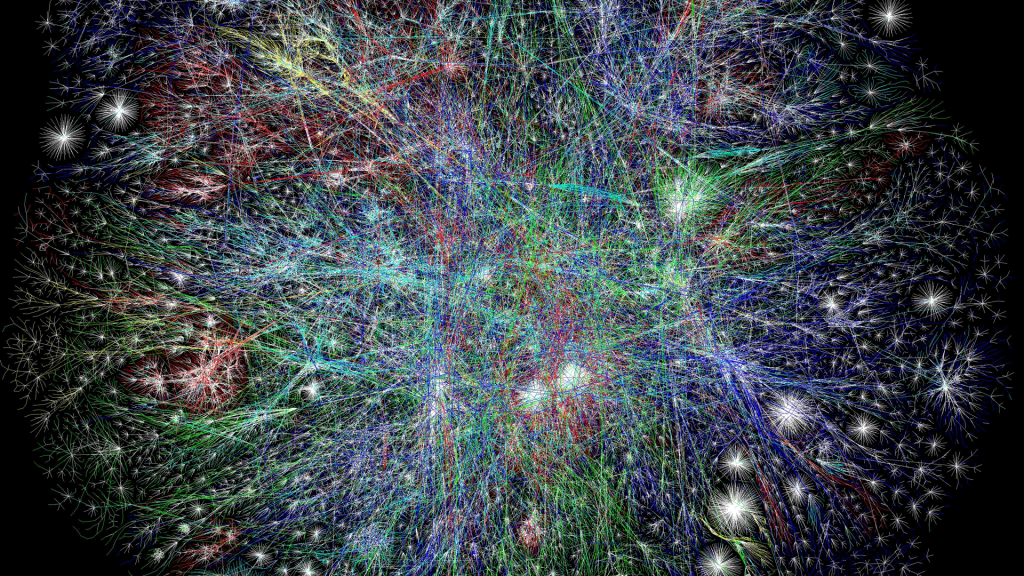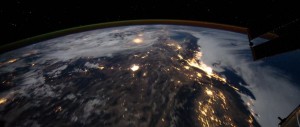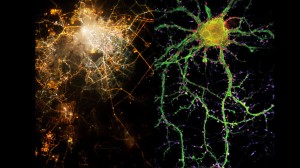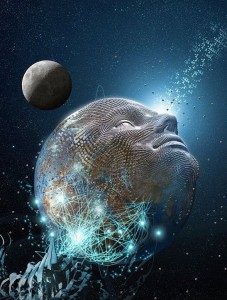Cadell Last is an evolutionary anthropologist at the Global Brain Institute and producer of the PBS Digital Studios series The Advanced Apes. In our recent email correspondence we discussed the possibility that our entire planet is waking up as a single super-intelligent organism, dreams of a technological singularity, and the possible consequences – both light and dark – of such a transition, both for humankind and the entire biosphere…
MG: So tell me about this conference you attended! That seems like a good place to start.
CL: I spoke at the first Evolution, Complexity, & Cognition Global Brain Institute seminar on October 4th last year. The seminar was hosted by cyberneticist Dr. Francis Heylighen. The function of the seminar was to help the Global Brain Institute develop a clear research trajectory for cybernetic and Global Brain theory. My talk was focused on an attempt to merge evolutionary, anthropological, and cybernetic theory. I think the result is a theory of meta-system transitions that can explain the pattern, diffusion, and timing of human meta-system transitions, with perhaps important insights into the future of our system development and evolution.
MG: So let’s pretend I didn’t understand what you just said. How do you see evolution, anthropology, and cybernetics coming together into a general theory of emergence that explains the birth of a “Global Brain?” Can you go into more detail about what you mean by “meta-system transitions” – like, systems of systems?
CL: Well, first I want to say that anthropology is a the human science, and evolutionary anthropology is a diverse discipline focused on understanding the evolution of our order, genus, and species. For this reason, I feel like any theory of the Global Brain would be incomplete if it excluded the evidence gained from studying our evolutionary history. Despite this, I think contemporary analyses of our system evolution have been lacking in evolutionary anthropological insight. Now, one thing that evolutionary anthropology has failed to do is develop a systems approach to human evolution. So this is what I want to do. This is what I mean when I say that I want to merge or integrate evolutionary, anthropological, and cybernetic theory. Cybernetics is the study of systems and system-level complexity. Evolution is the study of change. Anthropology is the study of humans. So there is a natural merger that can occur here, at least in my opinion. From my preliminary research I think this is going to be a very useful theoretical tool.
In short, I think our system “behaves” in a very predictable and surprisingly simple way. I think we can easily build a systems-level theory of our evolution that provides us with a quite detailed and accurate prediction on how it will behave in the 21st century. Such an analysis could provide us with tremendous insight about what our lives will be like both individual and collectively in the coming decades. Basically, I think current analyses suggest a major meta-system transition is going to occur sometime in the 2040s, or maybe the 2050s. By meta-system transition I mean, a new system-order or complexity. This will include new energy, new information transfer mechanisms, and perhaps most exciting, new transportation systems.
MG: I’m interested in the same things, only from the perspectives of paleontology (specifically, paleoecology, and what we can learn about our world by studying the relationships between organisms and environments throughout Earth’s history), developmental psychology (especially, how it is that the evolution of social order and the development of individual psychological structure reflect one another), and general evolutionary dynamics (in particular, the study of emergence and under what conditions we find these “meta-system transitions”).
I gave a talk about this at Burning Man in 2011 entitled “Evolutionary Transitions in Individuality“, which is the term evolutionary biologists use to describe these epochal shifts from, say, single-celled to multicellular life. They seem to happen as a response to increasing environmental complexity, and the pressure of natural selection to form meta-organisms that function as a new single unit. We’re seeing something similar occur on many levels right now – not only with the “Global Brain,” but also with research into technological forms of telepathy that would allow combat units to communicate with one another so fluidly they might as well be a single “meta-person.”
The way these transitions happen seems to be governed by a strongly convergent set of rules – like how a wing is a wing is a wing, no matter what animals evolve them. They happen for the same reasons and take the same basic form, in spite of the differences in structure and other details. But what your unique confluence of interests suggests to me is that you see ways in which this particular evolutionary transition into the transhuman is going to be uniquely characterized by our humanity, that it will carry the unique signature of our own heritage and legacy as a species. So I’d love to hear more about how the emergence of a human-based Global Brain will be characterized by our humanity (as opposed, to, say, another world’s Global Brain created by super-smart squids).
CL: Fantastic points about structural similarity within the biological world. Of course, we are humans and this will be a Global Brain built by humans with the support of our information and communication technologies (ICT). I suspect that planets do follow a natural history towards a Global Brain, regardless of the physical vessel that intelligence happens to reside within (e.g., squids). It is an interesting question as to what types of phenotypic characteristics a species would need to have to start building a Global Brain. Some biologists, like E.O. Wilson, contend that high intelligence can’t emerge in an aquatic environment for example (so he would say that a Squid Global Brain would be impossible). I disagree; I wrote about this for Scientific American last year. I think we just don’t have enough evidence to know whether an aquatic equivalent of what we are doing now would be possible.
That being said, it appears as though, on the scales of paleontological/geological time scales, our planet was ready to burst with intelligence – and that this intelligence does not have to evolve in a specific terrestrial environment. Let’s pretend for a second that the human lineage never made it. Let’s say the Toba Supervolcano wiped us out 74,000 years ago, or something like that. Our planet is currently filled with species that, given a couple million years and the right adaptations (say an opposable appendage or two), could be on their way to high intelligence (e.g., dolphins, octopuses, chimpanzees, gorillas, orangutans, corvids, bears, canines). These species are phylogenetically quite divergent; some of them are closely related to us, some of them are not. Some of them live in aquatic environments, and some live in terrestrial environments. Some of them can fly well; some of them can swim well; some of them can swing from trees well; and some of them can exist in the Arctic well. What they all have in common is a higher average encephalization quotient (EQ) than ever before in Earth history. Brains are bursting at the proverbial seams (again, on the scale of geologic time). So I should suspect that Global Brains could take several forms that would be unique to whatever species happened to win the “intelligence race,” even though the broad system-level similarity would be shared.
So what does this mean for a human-based Global Brain? Well, is it alright if I give a semi-cop-out response and say that it is unknowable? Let me explain my reasoning here. I think we can say a lot about the pathway towards a human Global Brain/meta-system transition/singularity, etc., but after that I feel as though “humanity” will be up for grabs. The framework I use to describe this is one comparing the biochemical pathway to the techno-cultural pathway. Everything that we currently experience via the biochemical pathway will be able to be replaced with a much more efficient and malleable techno-cultural equivalent. We will be able to say, what do we like about the human experience? And what don’t we like? Would we still like to sleep? Would we still like to defecate? Have biological sex? All of these things could technically be modified, enhanced, or eliminated altogether. I have my own hypotheses for what I think we’ll do to these fundamental aspects of the human experience on a system-level, but I think some of the details are unknowable.
Does that make sense?
MG: I’m still hoping we’ll find a Post-Squidularity civilization out there in the stars…
And I completely agree with your point that “humanity” as a concept, as a socially constructed category, will be up for grabs in the years to come. Greg Egan discussed this in his novel Distress, which was in some sense just reiterating for the science fiction crowd what postmodern thinkers like Donna Haraway and Katherine Hayles had already been saying for decades. Posthumanism, to distinguish that philosophical movement from Transhumanism, argues that what we call human is constantly being redefined – consider, for example, how recently it was that the average person finally came to accept people of different races as of equal standing in the species. Now we’re granting personhood to dolphins and talking about the rights of other animals to benefit from our intelligence-enhancing technologies, about creating an Interspecies Internet. Plenty of authors have made the point that what we consider a person nowadays would be person only in general body type, but psychologically unrecognizable, to people from any other era of our species.
And so, yeah, “humanity” will probably come to mean all kinds of wacky things – I know a bunch of people who are already camping in a proverbial line around the block for their new tentacles, gills, wings, computer backups, etc. But I seem to have a harder time than you do imagining that some watershed moment is ahead of us in time that marks an epochal break point into a radically different state of being than any previous radical shift. As far as I’m concerned, we’re already over the rainbow – it’s just become the new normal to us. And while I agree that the ratios of certain phenomena are clearly shifting, and we are bearing witness to an integration of disparate intelligences into a newly coherent planetary mind, I think it’s equally the case that bacteria created the first global communications network four billion years ago, and we’re just participating in a late-stage refinement of that ancient Global Brain. Complexity researchers like Neil Theise speak compellingly about mind and experience as a phenomenon that goes “all the way down” the “evolutionary ladder” (pardon the archaic shorthand) – and the globe-encircling planetary bioplasm, the Last Universal Common Ancestor from which all modern life is descended, bears more than a passing resemblance to the World Wide Web. Identity was fluid back then, genes exchanged freely among microbes in a way that we’re seeing now with social media and the increasingly permeable membranes of human selfhood facilitated by electronic communications.
To me this evolutionary transition has more in common with similar transitions in the past than we would like to believe in our characteristically human hubris. Sweeping transformation and the establishment of new transcendental evolutionary arenas seems to be the norm, around here. Anyway, I’m with you that this transition seems like an evolutionary (even a thermodynamic) inevitability. Where I lose the thread is when you take the argument that we see these same natural laws in place everywhere, that this pattern-recognition allows us to talk about an essentially transcendental superorganism waking up through us, and then to twist that and say somehow this same continuity is going to liberate us from having to take shits.
I mean, obviously, yes: everything is changing in our evolving mutual embrace with our technologies. But your vision of a hyperefficient, improved human seems too much like the same dangerous control fantasy we see causing so much trouble in allopathic medicine (“just prescribe your pain away” or “remove the problem with surgery” instead of recognizing the adaptive intelligence of depression or fever) or geoengineering (“let’s fill the atmosphere with metals” and damn the second-order consequences, instead of taking more long-term and sustainable approach to surfing the climate changes while reducing our interference with natural systems). Not to come down too hard on you, here, but I tend to agree that any sufficiently advanced civilization is indistinguishable from nature. True efficiency is in the familiar natural geometries of dissipative structures like gills and branches, not the austere grandeur of modern art and architecture.
Likewise, given evolution’s love for death, I think we may be able to redefine death (and excretion) – but even if nanobots are brushing our teeth and we shit a perfumed vapor, we’re still going to have these issues in one sense or another. Nothing that we have transcended, have we really left behind…
CL: I think we can find more points of agreement than disagreement, which is nice. I didn’t mean to trivialize transhumanism with my examples, it’s not all about hyperefficiency. What I was trying to communicate with those examples is the general trend towards ephemeralization. As the brilliant systems theorist Buckminster Fuller recognized back in the 1950s and 60s, the human system is in the process of doing more with less, until we can do everything with nothing. The physicist Stephen Wolfram emphasized a similar point at the Singularity Summit last year So in a sense, hyperefficiency should not only be a feature of the Global Brain, but a pre-requisite. We need to ensure that our self-organization and our distributed intelligence are maximized on a planetary scale, which is no small task. However, as Francis Heylighen outlined in his recent “Return to Eden” paper, we have the real technological pathways to achieve this in the near-term future. I feel like Peter Diamandis outlined a similar vision for these technological pathways in Abundance.
But after the hyper-efficiency is achieved, then all human minds are free to explore their true and full potential. Everyone will be able to spend their time how they actually want to spend it. When I was explaining this to a few people who had never truly considered the possibilities of Global Brain, I tried to get them to imagine a world in which every single human had the possibility to explore their intrinsic desires, without fear about where their next meal was coming from or whether they would have a roof over their head next month. In the Global Brain, I imagine a world in which ever single human can explore art, music, math, writing, science, athletics… whatever they truly want to do for a very long period of time. The technophilosopher Kevin Russell tried to capture this idea in an H+ magazine article about “immortal artists”. But we must also consider the possibility that new types of cultural expression, that may be unimaginable today, will also become possible. The Global Brain presents us with the possibility of forming higher level consciousness and explore information transfer systems that are as hard for us to imagine as understanding language would be to an australopithecine.
And so this is where I always emphasize that technological evolution always makes us more human, and not less. It is art, music, math, writing, etc. that make us human. That is what makes us different from other species, and yet so few of us get to explore these aspects of existence to our fullest potential. Often times we can’t due to practical constraints, due to the fact that our society is not efficient enough.
We cannot do everything with nothing yet.
I don’t see this type of thinking as encouraging some type of “control fantasy”. At the end of the day, we want to create a system that is in ecological symbiosis with the environment. We don’t want a Global Brain that controls the environment, we want a Global Brain that exists with the environment.
And in terms of fundamental properties of living systems (i..e, death, excretion), of course they will still be with us. I suspect that every consciousness must at one point end, and just because we can create hyper-efficient vessels for our consciousness, it certainly doesn’t mean that we can do away with metabolism. So we are in agreement. But we must also acknowledge that making our metabolism, and all other fundamental components of our being more efficient, provides us with the possibility to explore infinite opportunities. At least that’s my perspective.
MG: It’s a beautiful vision and one that I think is more accurate that most people currently accept…and for the sake of the world, I hope you’re right. But for the sake of a balanced conversation, I feel the need to also recognize the dialectic of history. If what we’re going through now is comparable to the emergence of eukaryotic cells from bacteria, or multicellular organisms from protists, then we can expect a period of intense conflict between worlds and structures (“tension” would be a euphemism). The kind of complex boundary zone between ages outlined by transhumanist author Ramez Naam in his fabulous novel, Nexus – one in which enhanced humans and posthuman AIs are regarded as “emerging risks” by nation states and repressed just like psychedelic substances and “disruptive” cryptocurrencies are today.
Even Heylighen, in the paper you mentioned, talks about a period of intense and difficult change on the way to the technological Eden he envisions – looking around us, the world is already in a state of constant cyber/economic/memetic warfare; there is a very all-bets-off transfer of power between governments and multinational corporations as described in Eric Schmidt and Jared Cohen’s The New Digital Age. Douglas Rushkoff points out in Present Shock that the physical geography of Manhattan is “optimizing” to resemble a giant computer chip in order to process financial transactions happening faster than anyone can comprehend, according to algorithms that nobody understands. Evgeny Morozov has argued very eloquently about how the very same “rule by algorithm” that would enable the enlightened leadership by “machines of loving grace” effectively dismantles the democratic process and with it all of the enlightenment ideals that brought us to this point – replacing them with a “mother knows best” world in which not even the programmer priest-class really has any say in things anymore. As MIT researchers start to investigate consciousness as a state of matter and talk with straight faces about the brain as “computronium” that could be made more efficient by thirty-eight orders of magnitude, I get the impression they’ve never read Charles Stross’ visionary singularity novel Accelerando, in which posthumans devour Earth for processor power and reject humankind from the inner solar system as if we were an infection.
Regardless of what amazing things are going on across the event horizon, there’s little doubt that this lauded shift is stratifying income all over the world, decimating the biosphere, and reshaping the human being in the image of a computer. I’m all for Buddhist detachment and an acceptance of the eternal mutability of things – and I wonder if in fact a world pollinated by robotic bees isn’t somehow an improvement, my grief at our loss notwithstanding. After all, a brain learns by pruning its connections; extinctions are as natural as anything. The system learns and keeps going.
We came awake as a species in a very unusual set of circumstances on Earth, ecologically speaking. As suspicious as I may sound of these changes, I’m also wary of making conservation an ideology. Transformation is a given, here – on that I know we agree – and I think we also agree that the right thing to do is to move into whatever future as wisely and compassionately as possible. Whether that means granting dolphins personhood – or standing up for the rights of digital organisms – or defending the freedom to experiment on our own consciousness – I know you and I both see a more creative world coming. Creation and destruction are two sides of the same coin…so care and mindfulness are key to participating in the emergence of a healthy Global Brain. Given that cardiac tissue is also full of neurons, and generates a more powerful electromagnetic field than the brain, may whatever’s coming also be a healthy Global Heart.
Thanks for the conversation, Cadell. And see you on the other side…
CL: Thank you!
Thoughts? Feedback is welcome in the comments…

















